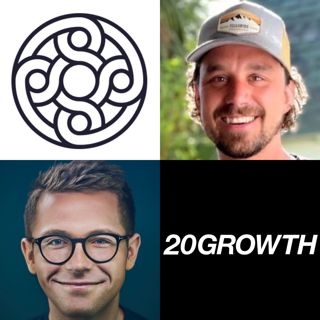
20Growth: Three Growth Lessons Scaling Whatsapp from 0-100M, Why You Should Hire a Head of Growth Sooner Than You Think & The Biggest Mistakes Founders Make When Hiring for Growth with Ryan Wiggins, Head of Growth @ Mercury
Ryan Wiggins is the VP of Growth and Analytics at Mercury where he oversees a Growth team and founded the Analytics function. Prior to this, Ryan built Growth teams at WhatsApp, where he helped grow WhatsApp Business from 0->100M users, Workplace, and Facebook Ads. If that was not enough, Ryan is also an active angel investor. In Today's Episode with Ryan Wiggins We Discuss: 1.) From US Department of Commerce to Leading Growth Teams: How Ryan made his initial foray into the world of growth with Facebook and Whatsapp? What does Ryan know now that he wishes he had known when he made the entry into growth? What advice does Ryan have for people who want to change their career but are not sure what they want to do? 2. ) Who and When: Building the Team: Should we hire a Head of Growth or a more junior growth hire first? What are the different profiles of growth hires? How do they change with business model? When is the right time to hire your first growth hire? What are the single biggest mistakes founders make on the timing of growth hires? 3.) How to Hire: The Process: Structurally, what is the right way to hire for a growth team? What does the interview process look like? What do you want to get out of each meeting? Should case studies be used, if so, should they be used for the company hiring or of the company where the candidate is from? What does the comp package look like for different growth hires? Who should be brought into the growth hiring process? What stage should they be involved? 4.) Onboarding: Setting Growth Up for Success: What is the ideal first 30,60 and 90 days for new growth hires? What can leaders do to ensure they are set up for the maximum chance of success? What are three of the biggest red flags bad growth hires show in the first 30 days? What are the biggest mistakes founders make in the onboarding process of growth hires?
19 Maj 202347min
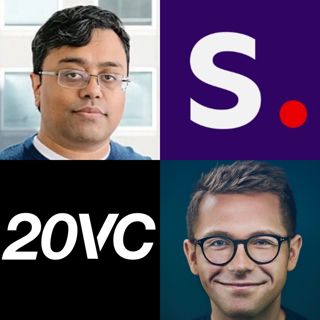
20VC: Why the AI Bubble Will Be Bigger Than The Dot Com Bubble, Why AI Will Have a Bigger Impact Than COVID, Why No Models Used Today Will Be Used in a Year, Why All Models are Biased and How AI Kills Traditional Media with Emad Mostaque, Founder & CEO @
Emad Mostaque is the Co-Founder and CEO @ StabilityAI, the parent company of Stable Diffusion. Stability are building the foundation to activate humanity's potential. To date, Emad has raised over $110M with Stability with the latest round reportedly pricing the company at $4BN. Investors include Coatue, Lightspeed, Sound Ventures, OSS Capital and Airstreet Capital, to name a few. Prior to Stability, Emad was in the world of hedge funds, that was until his son was diagnosed with autism and he left to make a difference in the space and help find treatments and solutions. In Today's Episode with Emad Mostaque We Discuss: 1.) From Hedge Funds to Finding Treatments for Autism to Leading the World of AI: How Emad made his way from the world of hedge funds to founding one of the leading AI companies of our time? How did Emad find a solution to parts of his son's autism with a $6 drug? How does Emad believe we can use AI to solve the majority of medical problems today? What does the future of healthcare look like with AI at the centre? 2.) Models: What is Real? What is False? Why no models today will be used in a year? Why all models are biased and how do we solve for it? Why hallucinations are a feature and not a bug? Why the size of your model does not matter anymore? Why will there be national models specified to cultures and nations? How is this implemented? 3.) Who Wins: Startups or Incumbents: Why does Emad believe there will only be 5 really important AI companies? Which will they be? How does Emad review Google's AI strategy following their news last week? Was their integration of Google and Deepmind recently a success? How does Emad assess Meta's AI strategy? Why does Zuckerberg now acknowledge the metaverse play was a mistake? How does Emad evaluate the approach taken by Amazon? Why are they the dark horse in the race? What can startups do to get a meaningful edge on the large incumbents? How do they compete with their distribution? 4.) The Next 12 Months: What Happens: Why does Emad believe the .ai bubble will be bigger than the dot com bubble? Why does Emad believe that the biggest companies built-in AI in the next 12 months will be services-based companies? How does the ecosystem look if this is the case? Why will India and emerging markets embrace AI faster than anyone else? What happens to economies that have large segments reliant on freelance work that AI replaces? Why will we see the death of many large content publishers and media companies? What does Emad mean when he says we will see the rise of "AI first publishers"? 5.) Open or Closed: What Wins: Why does Emad believe we must be open by default? Why does open win? Why does Emad side with Elon and believe we must pause the development of AI for 6 months? How does Emad evaluate the leaked memo from Google stating that neither Google nor OpenAI are ahead? What does this mean for the AI ecosystem? Where will the best AI talent concentrate? What do companies need to do to win the best talent?
17 Maj 20231h 6min
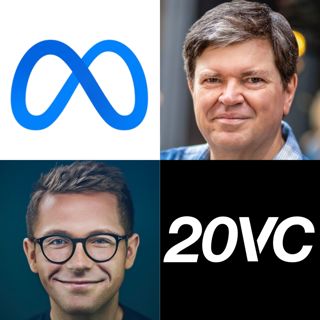
20VC: Yann LeCun on Why Artificial Intelligence Will Not Dominate Humanity, Why No Economists Believe All Jobs Will Be Replaced by AI, Why the Size of Models Matters Less and Less & Why Open Models Beat Closed Models
Yann LeCun is VP & Chief AI Scientist at Meta and Silver Professor at NYU affiliated with the Courant Institute of Mathematical Sciences & the Center for Data Science. He was the founding Director of FAIR and of the NYU Center for Data Science. After a postdoc in Toronto he joined AT&T Bell Labs in 1988, and AT&T Labs in 1996 as Head of Image Processing Research. He joined NYU as a professor in 2003 and Meta/Facebook in 2013. He is the recipient of the 2018 ACM Turing Award for "conceptual and engineering breakthroughs that have made deep neural networks a critical component of computing". Huge thanks to David Marcus for helping to make this happen. In Today's Episode with Yann LeCun: 1.) The Road to AI OG: How did Yann first hear about machine learning and make his foray into the world of AI? For 10 years plus, machine learning was in the shadows, how did Yan not get discouraged when the world did not appreciate the power of AI and ML? What does Yann know now that he wishes he had known when he started his career in machine learning? 2.) The Next Five Years of AI: Hope or Horror: Why does Yann believe it is nonsense that AI is dangerous? Why does Yann think it is crazy to assume that AI will even want to dominate humans? Why does Yann believe digital assistants will rule the world? If digital assistants do rule the world, what interface wins? Search? Chat? What happens to Google when digital assistants rule the world? 3.) Will Anyone Have Jobs in a World of AI: From speaking to many economists, why does Yann state "no economist thinks AI will replace jobs"? What jobs does Yann expect to be created in the next generation of the AI economy? What jobs does Yann believe are under more immediate threat/impact? Why does Yann expect the speed of transition to be much slower than people anticipate? Why does Yann believe Elon Musk is wrong to ask for the pausing of AI developments? 4.) Open or Closed: Who Wins: Why does Yann know that the open model will beat the closed model? Why is it superior for knowledge gathering and idea generation? What are some core historical precedents that have proved this to be true? What did Yann make of the leaked Google Memo last week? 5.) Startup vs Incumbent: Who Wins: Who does Yann believe will win the next 5 years of AI; startups or incumbents? How important are large models to winning in the next 12 months? In what ways does regulation and legal stop incumbents? How has he seen this at Meta? Has his role at Meta ever stopped him from being impartial? How does Yan deal with that?
15 Maj 202354min
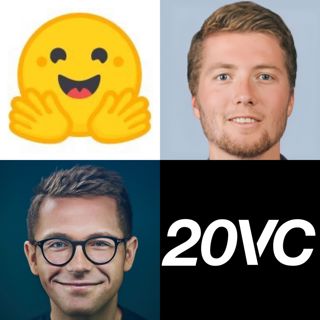
20VC: Why The Future of AI Is Open Not Closed, Why We Are Years Away From AI Being Autonomous, Why AI Founders Do Not Need to Move to the Valley & Why Founders Should Not Meet Investors in Between Rounds with Clem Delangue @ Hugging Face
Clem Delangue is the Co-Founder and CEO @ Hugging Face, the AI community building the future. To date, Clem has raised over $160M from the likes of Sequoia, Coatue, Addition and Lux Capital to name a few. Prior to Hugging Face, Clem was in product and marketing at two different startups both of which were acquired. In Today's Episode with Clem Delangue: 1. From Tamagotchi to Leading the World of AI: How did a Tamagotchi startup turn into one of the hottest AI startups in the world? What does Clem know now that he wishes he had known when he started? What are Clem's biggest pieces of advice to founders on pivoting? 2. AI: Trend or Transformation: To what extent does Clem believe the current hype in AI is justified? What is overblown? What have been some true and groundbreaking developments? How far away does Clem believe AGI is? What is a massive misconception the public has that Clem wishes he could change? 3. Open vs Closed: Which Model Wins: Why does Clem believe the future of AI will be won by open-source? What is his reasoning to suggest closed is fundamentally a weaker model? Does Clem acknowledge that in the short term, enterprises will buy from a closed model with greater ease? How does he plan to tackle this? 4. Regulation: What Happens Now: What regulatory changes need to be made in the world of AI most urgently? Is Elon Musk right to suggest the immediate pausing of developments in AI? What does Clem believe to be the most likely scenario to AI regulation in the next 12 months? 5. Fundraising: Lessons and Reflection on Raising $160M: Do AI startups fundamentally cost more money than normal startups to build? Why does Clem not meet investors in between rounds? What does Clem believe is the most helpful thing an investor can do? What are Clem's spiciest takes on venture as a financing model?
12 Maj 202347min
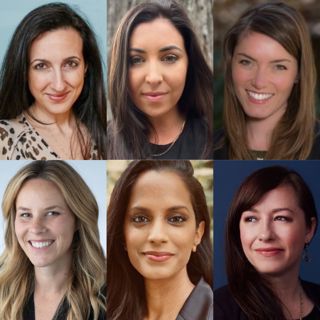
20Sales: How to Scale a Career While Scaling a Family, Strategies and Specific Tools To Help Maintain Work-Life Balance, What Companies Can Do To Empower Parents To Be Their Best Selves & How to Prevent Parental Leave Being an Inhibitor To Your Career
Today's 20Sales is a special Mother's Day edition where we are joined by 6 of the best sales leaders who also happen to be rockstar mothers. The Profiles Maggie Hott is on the GTM Team (Go-To-Market) at OpenAI. Before OpenAI, Maggie was Director of Sales @ Webflow and before Webflow spent an incredible 6 years at Slack. Stevie Case is the CRO @ Vanta. Prior to Vanta, Stevie spent an immensely successful 6 years at Twilio as VP of Mid-Market Sales. Renu Gupta is an advisor and sales consultant to some of the fastest-growing SaaS companies today. Previously she has held sales leadership roles at Slack, Thrive and Dropbox. Lauren Schwartz is the VP Enterprise Sales @ Fivetran. Before Fivetran, Lauren spent 4 years at Segment as Senior Director of Enterprise Sales leading to their acquisition by Twilio. Julie Maresca is the Head of Global Accounts at Atlassian. Prior to Atlassian, Julie spent an immensely successful 6 years at Slack in numerous roles including Head of Enterprise Sales for North America. Jessica Arnold is the VP of Global Sales Development @ Amplitude. Before Amplitude, Jessica was the Senior Director for Inside Sales North America at Dropbox for close to 6 years. In Today's 20Sales Mothers Day Episode We Discuss: 1.) How have you navigated growing in your career at the same time, growing your family? 2.) How do you balance your career and being a mother - when do you lean in and out? 3.) What are some specific strategies or tools that have helped you maintain a work-life balance? 4.) How do you prioritize your mental health and wellbeing while juggling your responsibilities at work and at home? 5.) How do you handle the guilt that many working mothers experience when they have to focus on their career? 6.) What are the unique challenges and advantages of being a mother in a sales leadership role? 7.) How has your experience as a mother influenced your leadership style and decision-making? 8.) How have you navigated going out on maternity leave without it having an impact on your career? 9.) America has one of the worst parental leaves of any country in the world. How can you advocate for parental leave if the existing policy isn't up to par? 10.) What are some ways that companies can create a more inclusive and supportive environment for working mothers in sales leadership roles?
10 Maj 20231h 5min
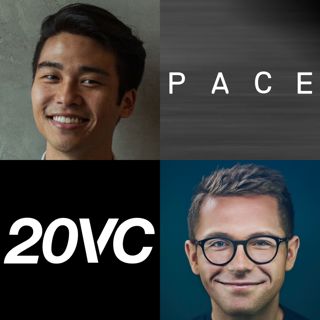
20VC: Why VC Subsidizes the Wrong Type of Business, Why Capital Gains Tax is Crazy, The Biggest Misalignments Between VCs, Founders and LPs, Why Business Model - Product Fit is as Important as Product-Market-Fit with Chris Paik @ Pace Capital
Chris Paik is a General Partner @ Pace Capital, an early-stage venture firm in NYC. Pace's first fund was $150M and their second was $250M. Before co-founding Pace, Chris was a General Partner at Thrive Capital where he spent an incredible 8 years having joined the firm when they were on their first $10M Fund. In Today's Episode with Chris Paik We Discuss: 1. From Hipster to One of NYC's Best VCs: How Chris made his way from not knowing about venture capital to being one of the most prominent in NYC? What are 1-2 of his biggest takeaways from his 8 years at Thrive? How did they impact how he thinks about building Pace today? What are Chris' biggest lessons from working with Josh Kushner? What did Josh do to spot young talent in a way like no one else did? 2. The Core Pillars of Successful Venture Investing: "Invest in companies that can be described in a single sentence". What does Chris mean by this? How does that impact the type of companies he looks to invest in? "Business Model Fit is as important as PMF". What does Chris mean by this? How does he determine where a company has business model fit? How does Chris analyze his relationship to market sizing? How does Chris think about how willing he is to take a bet on market timing? Why does Chris believe that the more "virtuous" a company is, the less enterprise value it will have? 3. What is Wrong with Venture Capital: The Misalignments: What does Chris believe are the single biggest misalignments between VCs and Founders? What does Chris see as the biggest misalignments between VCs and LPs? Why does Chris believe we should scrap capital gains tax and all be taxed as an income tax? Why do acquisitions allow investors to be screwed over by the acquiring company? 4. The Future of Social and User Generated Content Platforms: How does Chris analyze consumer businesses according to "The Seven Deadly Sins"? Why does he call them, "The Seven Deadly Motivators"? What does Chris believe is the future for Substack? Why does it not have Business Model Fit? What are 1-2 of his biggest lessons from being on the Twitch board? How did that experience impact his mindset and approach to what good is in UGC and social? What does Chris believe is the number one thing to look for in a potential consumer social investment? What do so many miss?
8 Maj 20231h 9min
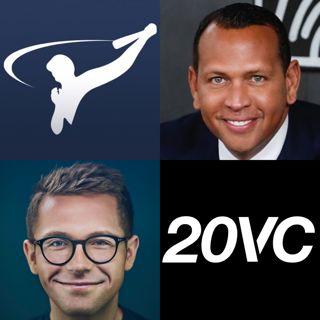
20VC: Alex Rodriguez (AROD) on Investing Lessons from Warren Buffet, How a Meeting with Magic Johnson Changed His Approach to Business and The Single Best and Worst Investment Decisions he has Made and Why AROD Is Not Buying More Real Estate
Alex Rodriguez is a businessman and the Chairman and Chief Executive Officer of A-Rod Corp, a broad-based investment firm that bets on world-class startups and partners with leading global companies across the real estate, health and wellness, technology, and sports & entertainment industries. While best known as one of the world's greatest athletes (a 14x MLB All-Star and a 2009 World Series Champion with the New York Yankees), for more than 25 years, Alex leads a team of experts building high-growth businesses and is co-owner of the Minnesota Timberwolves. In Today's Episode with Alex Rodriguez 1.) From MLB to Business MVP: How Alex made his transition from one of the world's greatest athletes to the world of business? What does Alex know now that he wishes he had known at the start of his business career? What is Alex running away from? How do his insecurities drive him? 2.) Lessons from Magic Johnson and Warren Buffet: What are some of the single biggest lessons Alex has learned from his time with Warren Buffet? How did Magic Johnson impact Alex's approach to business? What is Magic Johnson's framework? How can others use it as a blueprint for their career? 3.) Alex Rodriguez: The Business Builder and Investor: What has been Alex's single biggest investing hit? What did he learn from it? What has been Alex's single worst investment decision? How did that change his approach? Why is Alex not buying real estate currently? How does he view the future of real estate buying? 4.) Alex Rodriguez: The Father and Son: How did having two daughters impact Alex's approach to business and life? What have been Alex's single biggest lessons from seeing his single mother operate? How does Alex reflect on his own relationship to money? How has it changed?
5 Maj 202336min
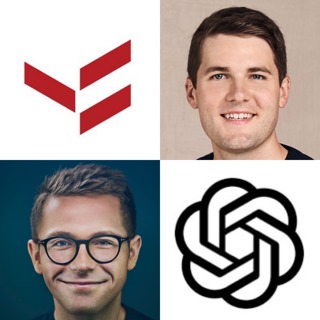
20VC: The OpenAI Memo: Why Invest? Is it too Late to Catch OpenAI? Are OpenAI's Models Truly Defensible? Does the Value in AI Accrue to Incumbemts or Startups - Application Layer/Infrastructure? What Happens with Regulation? with Vince Hankes @ Thrive
Vince Hankes is a Partner @ Thrive Capital where he has led the firm's investments in OpenAI, Melio, and Airplane.dev. He currently sits on the board of Airtable, Benchling, Lattice, and Melio. Prior to joining Thrive, Vince was an investor at Tiger Global where he learned the craft of venture from the legend that is Lee Fixel. In Today's Episode with Vince Hankes We Discuss: 1. From Tiger Global to Partner @ Thrive Capital: How Vince made his way into the world of investing with Tiger Global? What are 1-2 of his biggest takeaways from working alongside the legendary Lee Fixel? Why did Vince make the move from Tiger to Thrive? How do the two firms differ? 2. The OpenAI Investment: The Memo: How did the OpenAI deal come to be? What were the round dynamics? Market Evaluation: How did Vince and the team analyze the market top down? Competition: Who did Vince identify as the core competitors to OpenAI? Defensibility: How did Vince think through the long-term defensibility of OpenAI's model? Does Vince believe these models will become commoditised? Price: How did Vince and the team get comfortable with the $29BN price? 3. AI: Hype or Generational Defining Transformation: Trend or Transformation: Why does Vince believe AI will be the defining technology of our generation? Startup vs Incumbent: Does Vince think the value will accrue to the incumbent or the startup? Open or Closed: Does Vince think we will operate in a closed (one model rules them all) environment or an open-source environment with many models? AI Talent: Where does Vince think the majority of the best AI talent will concentrate? Speed: Why would Vince be scared if he were a startup today looking at the incumbents? 4. The Changing Investor: Lessons from Good and Bad: How has Vince changed most significantly as an investor over time? What has been his single biggest investing mistake? How did he learn from it? What has been his biggest investing success? How did that change his mindset? What has Thrive done in their org structure to allow them to make bets very few other firms can do?
3 Maj 202350min






















